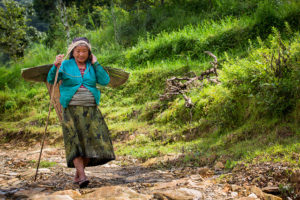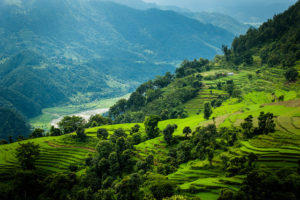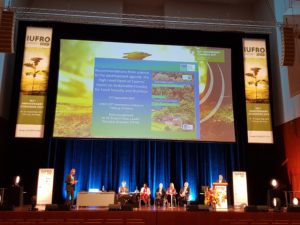
For the CGIAR Research Program on Forests, Trees and Agroforestry (FTA), a research for development (R4D) program, engaging in knowledge sharing fundamentally conditions the program’s effectiveness and impact, both in the policy environment and on the ground. Better sharing leads to better research.
That is why FTA, in recent months, has invested heavily in knowledge sharing. For us at FTA, knowledge sharing is never a one-way street, but an exchange. As we share our knowledge with stakeholders, we learn just as much, and we use that learning to set our next research priorities and better design the research that we do, to ensure greater legitimacy and relevance.
1. Knowledge sharing starts with better explaining the work we do, how we do it, with whom and for what.
FTA’s proposal for Phase 2 (2017-2022) amounts to over 500 pages. That’s the length needed to provide full details on a multimillion dollar six-year program as wide-ranging as FTA, with work from tree genetic resources to management, value chains, institutions and governance.
But not everyone can afford to spend a full week reading the whole thing. This is why we have created, with the program’s scientists, a set of brochures that explains in a nutshell the work being done and the work that we aim to develop across FTA. Six brochures have already been published and the last two will be released before the end of the year, including one on the brand new Flagship 2, which has just been rated “strong” by the Independent Science and Partner Council (ISPC) after a recent resubmission.
Read more: What is FTA?
To find the brochures, please take a look at our new webpage. We hope that in turn, resource partners will have clearer minds on what we do and what we bring on the ground, and will be even more keen to invest in FTA.
2. Knowledge sharing means engaging with key partner institutions with an aim to bridge the world of research with the world of development and people on the ground.
This means being able to understand, confront and match the various demands from development, and what research can supply and how. Three key events in September enabled us to put this into practice.
First, on Sept. 5-8 in Bern, Switzerland, FTA participated in the first International Conference on Research for Sustainable Development, in two panel sessions organized between the CGIAR and the Swiss Agency for Development and Cooperation (SDC).
This provided a means to better understand Switzerland’s priorities in terms of development actions, as well as to test the interest in joint works with Swiss private sector actors on sustainable value chains and responsible finance, and on climate change mitigation and adaptation.

The quality of the exchanges in Bern was very high and this provided a strong impetus for FTA to engage even more with Swiss upstream partners, in particular with universities such as the University of Bern and ETH Zurich, to downstream actors, and with SDC. As we will take this on board, this means working toward even more relevant and effective research in FTA.
Second, on Sept. 18-22 in Freiburg, Germany, more than 40 FTA scientists participated in some way in the historic International Union of Forest Research Organizations’ (IUFRO) 125th Anniversary Congress. At the congress, FTA and IUFRO cohosted a subplenary session on research priorities titled “Research for sustainable development: Forests, trees and agroforestry”. If you missed it, you will soon be able to watch it here.
The session enabled us to take the scientific forest research community out of its comfort zone, to put in question the priorities it should focus on, and look at how it should work in light of today’s development challenges. With research becoming increasingly specialized, the overarching challenge is to integrate the different dimensions of sustainable development and different objectives into the research questions, research methods and solutions we develop in practice. And to integrate research “in” development. This is easier said than done, but it will definitively serve as a guide for FTA’s internal priority setting, which will give primers to such integrated initiatives.

Third, FTA participated in a three-day high-level conference on food security and nutrition in an era of climate change, coorganized by the Food and Agriculture Organization of the United Nations (FAO) and the Government of Quebec. The conference showed Quebec’s potential in terms of supporting international development, especially in francophone areas such as West Africa. One of the highlights was the participation of First Nations and Inuit representatives.
Food security challenges for people in northern Canada are already considerable, and climate change has important impacts, as it will have for many other indigenous groups worldwide. This is testimony to the immense systemic changes that are ongoing right now because of climate change. We need to properly consider social impacts and dimensions to enable positive and durable change.
We need to embed this in our research, and in fact reconsider the way we do research: doing research with indigenous peoples and marginalized groups, and considering them not as the object of research, but including them in research as generators of knowledge in their own right. Here, engagement is a synonym for better learning and more legitimacy.
3. Knowledge sharing means engaging with policy and multistakeholder platforms.
In November and December FTA will be mobilized in three multistakeholder platforms of global importance, each dealing with one key impact area of FTA: food security and nutrition, climate change, and sustainable landscapes.
First is the 44th plenary session of the United Nations Committee on World Food Security (CFS), the highest food security governance body on the planet, which runs from Oct. 9–13. FTA is coorganizing two side events: the first focuses on feminism, forests and food security, with key Swedish partners, and the second focuses on priorities along the R4D continuum for improving the role of forests, trees and agroforestry in food security and nutrition, with the Food and Agriculture Organization of the United Nations (FAO), the Netherlands, the Swedish International Agricultural Network Initiative (SIANI) and Tropenbos International.

And after having heavily contributed to the High Level Panel of experts (HLPE) report providing the evidence base to the CFS negotiations on Sustainable Forestry For Food Security and Nutrition, FTA will participate in the policy round table itself, alongside governments and all actors gathered at CFS. This illustrates the double role of a R4D program like FTA: feeding multistakeholder discussions and decisions with evidence and knowledge (inclusively generated), and at the same time being an active stakeholder in the implementation of solutions, alongside all partners.
Then in November, FTA is set to engage further through several events with climate actors at the Fiji-led United Nations Framework Convention on Climate Change’s (UNFCCC) 23rd Conference of the Parties (COP23) in Bonn, Germany. FTA will aim to provide, with partners, a focus on gender, on REDD+ and on finance for sustainable value chains.
Finally, in December, FTA will be in Bonn once again for the major global multistakeholder platform on landscapes, the Global Landscapes Forum (GLF). There FTA will aim to feed knowledge and organize discussions on forests and water, and on land restoration.
While knowledge generation remains the core of FTA’s work, we believe that it may not be effective without efficient knowledge sharing and stakeholder engagement. Such an investment is necessary for a R4D program, which aims at the uptake of solutions on the ground. It is also synergetic with the research itself. It confronts us daily with new questions, and with the various beliefs, views and expectations of stakeholders.
If we genuinely measure the implications of the feedback we receive, on the research we do and its very design, then knowledge sharing and engagement is not simply adding “feel-good moments” to research that has already been done: It is fundamental to the quality of the research that is to come.
By Vincent Gitz, FTA Director











